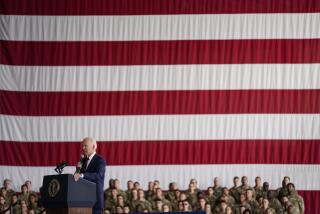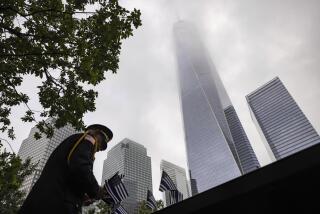Obama trying to strike a balance with Sept. 11 message
Reporting from Washington — White House officials were planning to commemorate the Sept. 11, 2001, attacks with a carefully calibrated message about the global threat of terrorism when reports of a possible plot aimed at New York and Washington turned the focus squarely back to the home front.
The development spotlights the challenge President Obama faces as he leads the nation in a series of emotional ceremonies Sunday.
Obama not only seeks to honor those killed 10 years ago, but to also point out his national security accomplishments to assure Americans that he is doing everything possible to keep them safe — a delicate mission that can’t appear to exploit a national tragedy.
He’ll remind Americans that extremists continue to seek ways to attack, a few days after U.S. authorities said they had received credible information about an Al Qaeda plot to use car bombs to blow up tunnels and bridges this weekend.
Such threats are a political reality for Obama. As his economic advisors strive to restore faith in the president’s ability to boost job growth, the White House’s national security team is guarding against perhaps the only kind of disaster that could eclipse the economy in the public’s eyes.
Obama’s advisors say they’re not revising their message about what the U.S. government is doing on the terrorism front. There will be references to military and intelligence operations that have killed Osama bin Laden and dozens of other Al Qaeda leaders, disrupting the organization and its efforts to develop other plots.
Yet Obama appears determined to avoid a perceived grab for credit, and advisors said he will focus on the importance of public service as a constructive response to attacks on the country.
Republicans have tapped former New York Mayor Rudolph W. Giuliani to give their weekly broadcast address — usually seen as a rebuttal to Obama’s own weekly remarks on the political fight of the moment.
“I can’t think of a better person,” said Republican Senate Minority Leader Mitch McConnell, “to offer his perspective on that dark day in American history.”
Republicans were braced for Obama to use this moment of heightened patriotism to his advantage Thursday, when he unveiled his jobs package in a speech to Congress. Before the speech, House Majority Leader Eric Cantor warned that the president shouldn’t portray Republican opposition to his proposals as “un-American.” But Obama did not make a reference to Sept. 11 in the speech.
On Sunday, Obama is scheduled to visit the World Trade Center site with former President George W. Bush, and then appear in Shanksville, Pa., for a ceremony at the United Flight 93 crash site. Obama will later attend a Pentagon ceremony and concert at the Kennedy Center commemorating the attacks.
The president’s appearances at those sites deliver a critical message, said Rick “Ozzie” Nelson, a domestic security and counter-terrorism expert at the Center for Strategic and International Studies in Washington.
“This is an opportunity, while he has the attention of the world and the attention of the American people, to say, ‘Let’s not forget what this organization did to us,’” Nelson said. “I know we’re all growing tired of fighting it, but we have to finish what we started.”
But overplaying the message about the U.S. killing Bin Laden could have a negative effect on Obama’s foreign agenda, Nelson said.
At the same time, Obama does have political considerations to think about, and some allies in Congress want voters to appreciate that their Democratic president is on top of national security.
The U.S. has been safe under Obama’s leadership, said Sen. Richard J. Durbin (D-Ill.), and the president has a “good story to tell” about tracking down terrorists and thwarting plots.
“There’s only so much you can do,” Durbin said. “If you go overboard in taking credit for it, there’s a reaction against you.”
For some Democrats, the greatest electoral fear is that there will be a plot the administration can’t prevent. But Andrew Kohut of the Pew Research Center rejects the assumption that an attack would doom Obama’s chances to be reelected.
In fact, the Sept. 11 attacks saw a surge in President Bush’s ratings, just as the 1979 hostage crisis in Iran boosted President Carter’s, at least through the early Democratic primaries. It was a failed attempt to rescue the hostages — and a struggling economy — that ultimately contributed to Carter’s defeat in 1980.
“People will judge the president based upon his response,” Kohut said, “but that’s generally over a longer period of time or in response to a dramatic success or failure.”
kathleen.hennessey@latimes.com
More to Read
Sign up for Essential California
The most important California stories and recommendations in your inbox every morning.
You may occasionally receive promotional content from the Los Angeles Times.












